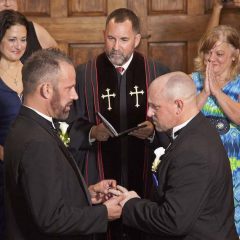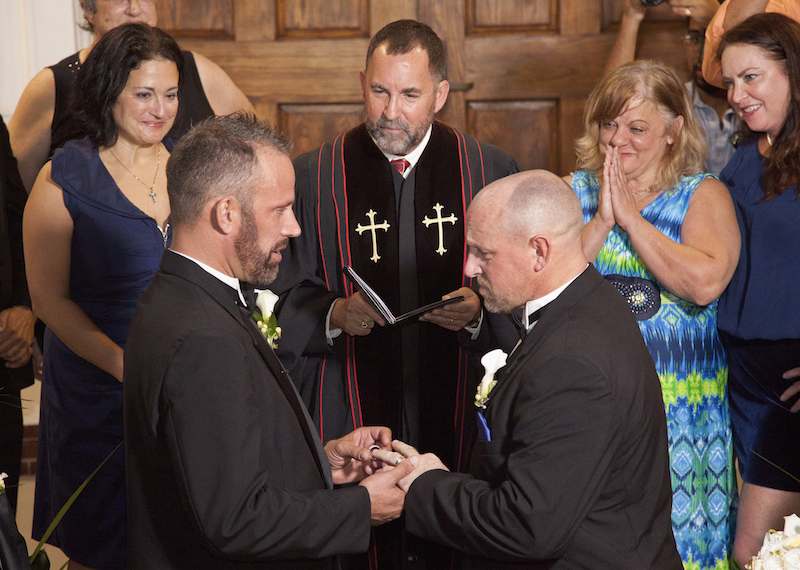
Aaron Huntsman (left) and William Lee Jones (right) are married in Key West, Fla., with the Rev. Steve Torrence officiating, the first couple to marry in the Florida Keys. Photo courtesy of REUTERS/Carol Tedesco/Florida Keys News Bureau // RNS-GAY-MARRIAGE, originally transmitted Jan. 28, 2015
I was reminded of this often-overlooked principle when I read a recent blog post by Southern Baptist college professor Denny Burk on Jesus’ words in Matthew 25:40: “Whatever you did for one of the least of these brothers and sisters of mine, you did for me.” Burk argued ably that despite the belief among many modern Christians’ that Jesus is speaking of the poor here, the phrase “least of these” actually refers to Christians who have been persecuted for preaching the good news. It turns out that many respected Bible scholars agree.
>>READ ALSO: “Who are ‘the least of these?’ Scholars say Mother Teresa and others may be wrong”<<
If one accepts such an interpretation, I can think of any number of modern applications: the 21 Coptic Christians martyred in Libya, the Pakistani pastor whose life is in danger for preaching the Gospel, the hundreds of Christians imprisoned for sharing their faith in China. But Burk claims that the “least of these” are Christian bakers, florists, and photographers who have been penalized for refusing to serve LGBT couples.
Now I’ve argued repeatedly that marketplace discrimination against a people group—gay or otherwise—is neither noble nor Christian. But setting this aside for a moment, Burk’s assertion reminds us once again that a good interpretation doesn’t guarantee a good application.
Burk believes that the “least of these” refers to Christians who are preaching the Christian Gospel, but such is not the case in the instances he mentions. None of the bakers, photographers, or florists in question were penalized for preaching the Gospel. They were penalized for refusing to serve certain classes of people even though the law states that those who operate public businesses are required to serve the whole public. Since Burk has clearly given this much thought, I asked him what I may be missing.
“All Christians are called to bear witness to Christ in the world. In the case of the Washington florist Barronelle Studzman, a gay couple asked her to participate in their wedding. She said that she couldn’t because of her ‘relationship to Jesus.’ As a result of that, she was sued by both the Attorney General and the gay couple,” Burk said. “In short, she declared her allegiance to Jesus and was dragged to court for it and lost. She now could lose her business and her retirement. If my interpretation of Matthew 25:40 is correct, certainly this 70-year-old Christian grandmother is among the ‘least of these.’”
But this still didn’t seem to get to the root of the issue. When Jack Phillips of Masterpiece Cakeshop in Colorado refused to serve David Mullins and Charlie Craig, he was not trying to convert them. When the door opened, Jack didn’t think “I’m going to preach the Gospel to these gentlemen today” but rather “Here are some customers who might purchase a cake from my business today.” And that’s why when Phillips was penalized, the judge did not say, “You’re being fined because you preached the Gospel” but rather “You’re being fined because the law is clear that public businesses must serve the whole public.”
At this point, I decided to ask some reputable Bible scholars what they thought. Of the four I spoke with, three agreed with Burk’s interpretation but none believed applying this verse to business owners refusing to serve LGBT couples was appropriate.
Scot McKnight, author and professor of New Testament at Northern Baptist Theological Seminary, said he believed such an application misuses the text to score points in the culture wars:
It is at best a long stretch and at worst a willful misapplication to get from these words of Jesus to missioners to anything like what is going on in the culture wars in the USA today.
Craig Keener, author and professor at Asbury Theological Seminary, said such an application doesn’t square with any major interpretation held by Christians throughout history:
“I don’t think that’s an appropriate application of this text, and actually, I don’t see how you get from any main exegesis of that passage to that application. If you take it as referring to the poor or the Christian poor, it doesn’t fit. If you take it to refer to messengers of the kingdom, it doesn’t fit either. So it seems to me to be a stretch. I’m not sure how one gets to the Christian cake baker from this text.”
Craig Blomberg, professor at Denver Seminary and author of numerous books on Jesus’ parables, said such an application doesn’t fit the context of Matthew 25:
In context, if you accept the interpretation that the least are Christian, they are still those who are without adequate clothing, in prison, hungry, etcetera. If the day comes when we no longer have religious freedom and someone is imprisoned for declining to provide services for another person even as a private entrepreneur, then the passage could apply. If the day comes when persecution of believers in this country makes it impossible to feed ourselves, then yes. Meanwhile, I’d say it’s too much of a stretch.
>>READ ALSO: “In the Middle East, not America, Christians are actually persecuted.<<
Klyne Snodgrass, recently retired professor at North Park Theological Seminary who specialized in Jesus’ parables, said such an assertion misapplies scripture to a contemporary problem:
This is a case where someone is taking the scripture and using it to deal with a contemporary problem. Matthew is not dealing with our problem, and this text can’t be used to deal with it. We can have that discussion, but not using this text. Matthew was not addressing this to the gay problem in the U.S., and we need to derive a Biblical theology about that apart from this text. To try to say that this text is addressing that issue is an abuse of the text. The force of this text is on bringing about care for people in genuine need. The problem is that people want parables to be a systematic theology, but they aren’t.
Of course, McKnight, Blomberg, Keener, Snodgrass, and I could all be wrong. As always, dear readers, I leave it to you to decide for yourselves.






